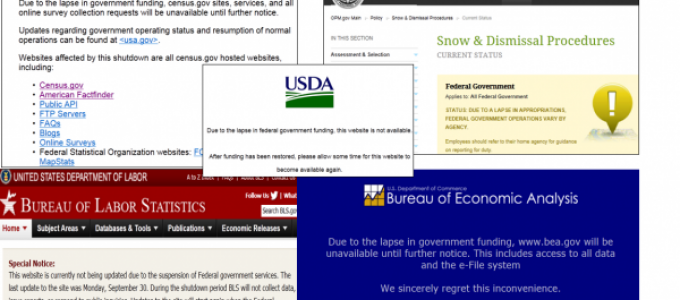I really should have seen it coming
Two weeks before the shutdown, during our last conference call between the directors at the Census Research Data Centers and the Census Bureau, we touched on some consequences of the potential shutdown – the administrators for the RDCs were considered non-essential personnel, so they would be furloughed. Absent the required presence of the administrators, the facilities would be closed. This was unfortunate, but hardly the greatest of the barriers that researchers face in gaining access to and working with restricted use resources in these highly secure facilities. Less obvious were the consequences in the world of public data.
Back in my office last Tuesday, I found that “[d]ue to the lapse in government funding, census.gov sites, services, and all online survey collection requests will be unavailable until further notice”. Similar notices could be found on the sites for the Bureau of Economic Analysis, the US Department of Agriculture, and the National Center for Education Statistics; other sites (like the Bureau of Labor Statistics or the National Center for Health Statistics were operational but not being updated. These sites are workhorses in my meetings with students, since they offer a wealth of amply documented high quality research ready data for many purposes.
Stepping Into the breach
Alternatives exist is many cases – the NHGIS at Minnesota, John Blodgett’s tools and data at the Missouri Census Data Center, StatsAmerica or local resources like those produced by the California Department of Finance’s Demographic Research Unit. Researchers willing to “roll their own” can use the SDA interface to the Integrated Public Use Microdata Series or download the IPUMS microdata and work with it on their own computers. The Wayback Machine also offered an avenue to reach static tables and resources. One of my favorite (fee-based) tools -- Social Explorer -- even opened up free access to their resources during the government shutdown, and NICAR sped up their beta release of their tools. In the medium term, jarring researchers from their familiar sources may even be good, since we run across new collections or modes of access.
The underlying problem
More problematic are the ongoing attacks on the data collections which upon which all of these federal statistics depend. As a result of the sequester, BEA eliminated elements of the Local Area Personal Income products, as well as products related to their Regional Input-Output Modeling System (RIMS) and Foreign Direct Investment (FDI). The BLS eliminated its Mass Layoffs collections, as well as its International Labor Comparisons program. The Energy Information Administration put off it survey of residential energy use, the USDA suspended, curtailed or phased out a number of surveys and data products, and the Census Bureau delayed implementation of new poverty measures, as well as the release of new data from the Economic Census and SIPP, and will be unable to test some Census 2020 data collection options. This comes on the heels of the elimination of the Statistical Abstract of the United States (now available for a fee from ProQuest), and repeated attempts to defund the American Community Survey (ACS). There’s no doubt that high quality data collections are not cheap – the question is whether their elimination will wind up being more costly yet.
Tomorrow, I’ll be talking to geography students about tools other than those on these shutdown sites – so that they can have a chance to play with the data…. but I’ll be equally sure to devote just a bit more time to where these data come from, and why they are the “gold standard” for so many uses.
In the meantime, does anyone have recent IPEDS data? I could really use it.
Let me know what you think at jons@berkeley.edu.
Ps. Thanks to Suzan Reagan at http://bber.unm.edu/ for the graphic.

